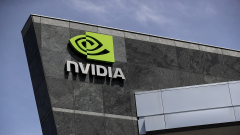A sign is posted in front of the Nvidia headquarters in Santa Clara, California, May 10, 2018.
Justin Sullivan | Getty Images News | Getty Images
The U.S. Department of Commerce announced Tuesday that it plans to prevent the sale of more advanced artificial intelligence chips to China in the coming weeks.
The U.S. government says the new rules are intended to close loopholes that popped up after last year’s restrictions on AI chip exports went into effect.
Shares of chip stocks took a leg lower in Tuesday morning trading on the news. Nvidia was down about 5% while Broadcom and Marvell slipped about 2%. Shares of AMD fell more than 3%; Intel fell about 1.5%.
Those earlier restrictions banned the sale of the Nvidia H100, which is the processor of choice for AI firms in the U.S. such as OpenAI. Instead, Chinese companies were able to buy a slightly slowed-down version called the H800 or A800 that complies with U.S. restrictions, primarily by slowing down an on-device connection speed, called an interconnect.
The new rules will ban those chips as well, senior administration officials said in a briefing with reporters.
The restrictions could also affect chips sold by Intel and AMD. Other rules will likely hamper the sale and export to China of semiconductor manufacturing equipment from companies such as Applied Materials, Lam and KLA.
The restrictions cut off a big and growing market for AI semiconductors, and could raise concerns that the Chinese government will retaliate economically against U.S. firms doing business in the country.
The goal of the U.S. restrictions is to prevent Chinese access to advanced semiconductors that could fuel breakthroughs in artificial intelligence, especially with military uses, U.S. Commerce Secretary Gina Raimondo said on a call with reporters. They’re not intended to hurt Chinese economic growth, U.S. officials said.
“The updates are specifically designed to control access to computing power, which will significantly slow the PRC’s development of next-generation frontier model, and could be leveraged in ways that threaten the U.S. and our allies, especially because they could





